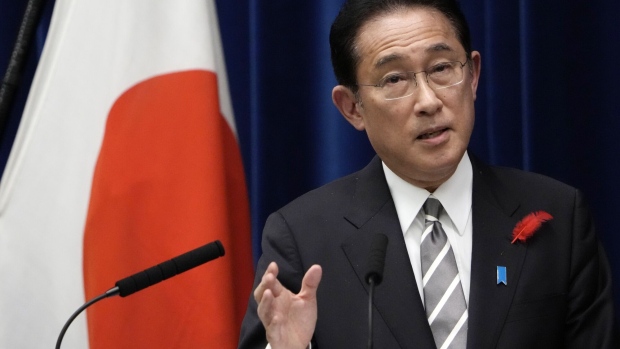Mar 28, 2024
Kishida Supports BOJ Easing, But Warns Against Weak Yen
, Bloomberg News

(Bloomberg) -- Prime Minister Fumio Kishida pressed the need for keeping in place Japan’s monetary easing, while he repeated his administration’s warning against a weakening yen.
Kishida told a news conference Thursday that the economy is “still midway” on the road to beat deflation and it’s appropriate for the Bank of Japan to maintain monetary easing, even after scrapping the negative interest rate in its first rate hike in 17 years.
“Preventing a recurrence of deflation is the purpose of my administration’s existence,” Kishida said after parliament passed a budget for the fiscal year that starts next month.
His cautious stance on the price outlook suggests the government won’t support any rapid additional interest rate hikes by the BOJ. Earlier this week, cautious comments by central bank officials helped push the yen to a 34-year low against the dollar, prompting senior officials to ramp up warnings against the currency’s plunge.
Finance Minister Shunichi Suzuki on Wednesday pledged “bold measures against excessive moves” and said the government wouldn’t rule out any options after the yen slid to 151.97 against the dollar. Kishida repeated his warnings on Thursday.
While the Japanese currency has since strengthened a little, it remains close to levels not seen in decades, largely because interest rates are much lower than those in the US and elsewhere — even after the BOJ’s historic rate hike. The yen was little changed following Kishida’s remarks and traded at 151.27 per dollar on Thursday night in Tokyo.
The weaker yen has helped exporters, but hurt consumers by increasing the prices of fuel and food — with incomes failing to keep pace. The burden on households could further worsen from the summer, with the government set to end subsidies on gas and electricity just ahead of the hottest time of year, NHK reported Thursday.
READ: Japan Steps Closer to Intervention as Yen Hits Lowest Since 1990
Kishida pledged that consumers would see their incomes beat inflation this year and from next year, they will get higher wage hikes beyond the rising costs of living.
©2024 Bloomberg L.P.





